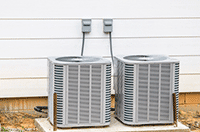 A neglected HVAC system can cost as much as 25 percent more in energy costs, and this doesn’t include energy wasted by ductwork problems and potential repairs. By preparing your heat pump or A/C for the cooling months, you can enjoy many benefits, such as greater comfort and lower energy bills. Here are a few tips you can follow to keep your HVAC system in prime condition this spring:
A neglected HVAC system can cost as much as 25 percent more in energy costs, and this doesn’t include energy wasted by ductwork problems and potential repairs. By preparing your heat pump or A/C for the cooling months, you can enjoy many benefits, such as greater comfort and lower energy bills. Here are a few tips you can follow to keep your HVAC system in prime condition this spring:
Donald P. Dick Air Conditioning Blog: Posts Tagged ‘energy consumption’
Make Sure Your HVAC System is in Prime Condition This Spring
Tuesday, March 31st, 2015Easy Ways to Reduce Your Home’s Energy Footprint
Tuesday, December 23rd, 2014Your home leaves behind tracks that reveal its unique energy footprint. In any house, the ways to conserve more energy run the gamut from simple DIY tasks to major efficiency upgrades. When it comes to heating and cooling, the good news is that reducing your energy consumption is often accompanied by increased indoor comfort and lower operating costs.
An Energy Audit Will Help Detect Where You’re Wasting Energy
Tuesday, October 14th, 2014 The colder weather is fast approaching with winter not far behind. As you begin running your heating system this year, you should consider calling an HVAC expert to conduct an energy audit of your home. An energy audit, or energy assessment, can tell you where your home is potentially costing you in energy costs due to inefficiencies, air leaks and other issues.
The colder weather is fast approaching with winter not far behind. As you begin running your heating system this year, you should consider calling an HVAC expert to conduct an energy audit of your home. An energy audit, or energy assessment, can tell you where your home is potentially costing you in energy costs due to inefficiencies, air leaks and other issues.
Did You Know A Ceiling Fan Can Help You Stay Comfy This Winter?
Thursday, October 18th, 2012 A ceiling fan has been standard equipment for hot weather since the 1800s. By circulating air downward in a room, they make rooms feel about four degrees cooler on summer days. However, the great majority of ceiling fans have a switch that reverses rotation of the fan, making them useful in winter, too. Instead of circulating air downwards, clockwise rotation in winter draws air up from below, blending it into warm air that naturally collects at the ceiling. The warmed air is driven out to the walls and then pushed back down into the room. This distributes heat more evenly around the room and reduces heat loss through the ceiling. A ceiling fan uses about as much electricity as a 100-watt light bulb but can cut energy consumption in a room 10 percent by allowing the furnace to run less often or at a lower level of operation. Fans can also be placed on the ceiling above stairwells to prevent heat migration from lower floors to upper floors in winter.
A ceiling fan has been standard equipment for hot weather since the 1800s. By circulating air downward in a room, they make rooms feel about four degrees cooler on summer days. However, the great majority of ceiling fans have a switch that reverses rotation of the fan, making them useful in winter, too. Instead of circulating air downwards, clockwise rotation in winter draws air up from below, blending it into warm air that naturally collects at the ceiling. The warmed air is driven out to the walls and then pushed back down into the room. This distributes heat more evenly around the room and reduces heat loss through the ceiling. A ceiling fan uses about as much electricity as a 100-watt light bulb but can cut energy consumption in a room 10 percent by allowing the furnace to run less often or at a lower level of operation. Fans can also be placed on the ceiling above stairwells to prevent heat migration from lower floors to upper floors in winter.
Let The Energy Star Guide You When You’re Upgrading To High Efficiency
Thursday, September 15th, 2011Improving your home’s energy efficiency and cutting down your electricity consumption is doubly beneficial. First, it helps you save money on your utility bills. Energy-efficient households tend to pay hundreds or even thousands of dollars less per year in utility costs. Second, you’ll be helping to preserve a greener tomorrow for future generations to enjoy. Given that heating and cooling costs make up more than half of all energy consumption in the average American household, finding ways to cut back consumption in these areas holds tremendous money-saving potential.
Summer Is In Full Swing: Use These Operational Tips To Augment Your Air-Conditioning System
Tuesday, August 30th, 2011Duct Sealing Is Essential To Energy Efficiency
Wednesday, May 18th, 2011If you’re trying to cut heating and cooling costs, one of the first things you should consider doing is sealing your ducts. According to the Department of Energy, 75 percent of homes in the U.S. are affected by leaky ductwork. If your home falls into this group, you could be losing a great deal in annual energy costs.
